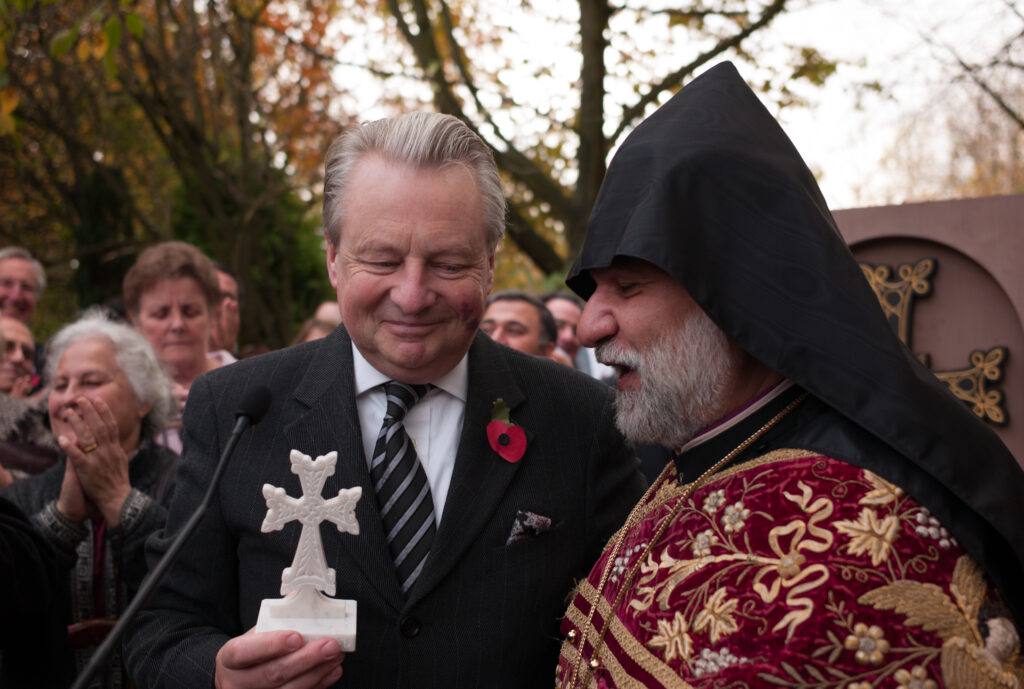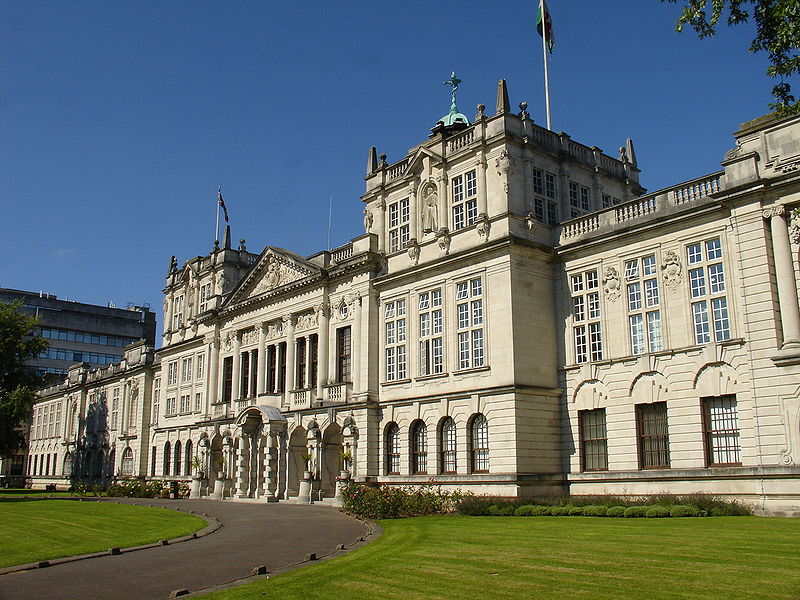On Armenian Genocide day, Dr Patrick Thomas reflects on the history of the ties between Wales and the Armenian people.
The links between Wales and the Armenians stretch far back into history. For example, many writers have commented on the similarities between the carved crosses of early mediaeval Welsh Christianity and the intricate khatchkars (cross-stones) carved by Armenians in the same period.
The connection strengthened in 1895 when the Ottoman ‘Red Sultan’ Abdul Hamid began systematically massacring many of his Armenian subjects. Former Prime Minister W.E. Gladstone came out of his retirement at Hawarden in Flintshire to address two public meetings in support of the Armenians, remarking that “To serve the Armenians is to serve civilization”. The Armenians expressed their gratitude for Gladstone’s intervention by donating a silver chalice and a stained glass memorial window to St Deiniol’s Church, Hawarden, and an illuminated Gospel-book, now in Gladstone’s Library.
In 1915, at the height of the First World War, the Ottoman authorities began an attempt to completely annihilate their Armenian population. Over a million Armenians died in the most horrific circumstances. It was this unprecedented horror which led the legal scholar Raphael Lemkin to coin the word ‘genocide’. Although the British government condemned the perpetrators for ‘crimes against humanity’, their declaration was not followed up by action.
In 2000 a majority of members of the Welsh Assembly called for the recognition of the 1915 Genocide of the Armenians.
Since then, the United Kingdom government has consistently refused to recognise the events of 1915 as genocide, despite the views of the majority of international historians who have examined the evidence and the opinion expressed by the distinguished human rights lawyer Geoffrey Robertson QC. Of the nations of the United Kingdom, only Wales has taken a different view. In 2000 a majority of members of the Welsh Assembly called for the recognition of the 1915 Genocide of the Armenians.
In 2001 the Armenians were included in the joint Holocaust Memorial Day event in Cardiff. This was a reminder that, on the eve of his invasion of Poland, Hitler had attempted to excuse his genocidal intentions by saying “Who, after all, remembers the Armenians?” Gwynedd County Council unanimously voted to recognise the Armenian Genocide in 2004, and later a plaque was placed in the County Hall in Caernarfon to commemorate the event.
A memorial khatchkar to the victims of the Armenian genocide of 1915 with the word ‘genocide’ in Armenian, Welsh and English was unveiled in the garden of the Cardiff Temple of Peace by Lord Dafydd Elis Thomas, Speaker/Llywydd of the Welsh Assembly. It is the only Armenian Genocide memorial on public ground in the British Isles.
Gofod i drafod, dadlau, ac ymchwilio.
Cefnogwch brif felin drafod annibynnol Cymru.
In 2013 the Church in Wales recognised April 24th as Armenian Genocide Day. A bilingual liturgy was written for the occasion by Canon Patrick Thomas and Bishop Vahan Hovhanessian. Two years later, in gratitude for this recognition, the Welsh Armenians gave a full-size bronze memorial sculpture by Cardiff artist Mariam Torosyan, to St David’s Cathedral in Pembrokeshire. They were following the tradition of their ancestors, who 120 years before had donated works of art to Gladstone’s church in Hawarden.
Artsakh (Nagorno-Karabakh)
In 2020 and 2022, as in 1895 and 1915, the world was preoccupied. Taking advantage of such distractions, Azerbaijan (like the Ottomans and Turks on the earlier occasions) has displaced Armenians and occupied their ancestral homelands.
A short but brutal war ended with a ceasefire between ethnically Armenian Artsakh (Nagorno Karabakh) and Azerbaijan in 2020. On December 12th 2022, in gross violation of international law and specific legal obligations, Azerbaijan blocked the only road connecting Artsakh to Armenia. In doing so, it cut off the people of Artsakh from the outside world.
What is taking place in Nagorno Karabakh as a result of Azeri aggression is in danger of becoming another episode in the tragic history of the Genocide of Armenians.
The population of 120,000 include 30,000 children and over 9,000 disabled people. So-called Russian peacekeepers have shown their inability and unwillingness to prevent both the road closure and frequent Azerbaijani attacks along the border. As a result, the population of Artsakh faces a growing humanitarian catastrophe, with the consistent violation of their rights to free movement, family life, appropriate healthcare, education and other essential elements of civilized existence.
The Senedd and the Welsh Government have been asked to appeal to the United Kingdom Government to:
- Implement effective sanctions against Azerbaijan, pressing it to immediately end the blockade of Nagorno Karabakh.
- Follow the calls from the UN ICJ to replace Russian forces with OSCE international peacekeepers, under a UN mandate.
- Return POWs and civilians held captive in Azerbaijan.
- Reinstate the borders as negotiated in the ceasefire.
What is taking place in Nagorno Karabakh as a result of Azeri aggression is in danger of becoming another episode in the tragic history of the Genocide of Armenians. If the United Kingdom Government, swayed by business interests, allows this to continue unchecked, it will compound its shameful record of Genocide denial.
April 24 as Armenian Genocide Day
Every year on April 24, the Armenian people and their friends gather by the Genocide memorial to remember and lay flowers in memory of 1.5 million Armenians cherished during 1915-23. Many of them are descendants of the victims who escaped the persecutions and fled from their homes to safer shores around the world.
For Armenians, each year on this day it is a time for national reflection, honour and prays. The descendants of the survivors of the Armenian Genocide continue to live with hope for a day when the perpetrators will finally be brought to justice.
Each year on this day, the leaders of national, subnational or local governments pay tribute to remember the lives of all those who died in the Ottoman-era Armenian Genocide. The importance of the remembrance, as stated by the US President Joe Biden, is to recommit to do everything in their power to ‘preventing such an atrocity from ever again occurring.’ The Armenians in Wales would like to see a similar commitment by the leaders of the Welsh and UK Governments to prevent an imminent genocide of Armenians in 2023.
To find out more about the Armenian Community in Wales, click here.
All articles published on the welsh agenda are subject to IWA’s disclaimer. If you want to support our work tackling Wales’ key challenges, consider becoming a member.





